Foreign
Trump shot in ear in rally assassination attempt
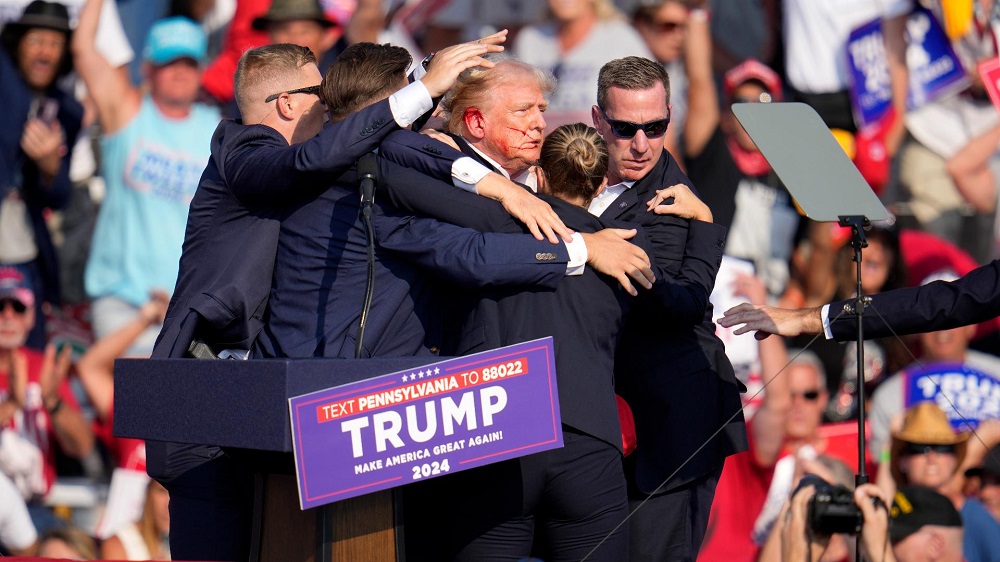
Former US President Donald Trump was rushed off stage after gunshots erupted at a rally in Pennsylvania in an apparent assassination attempt.
Footage showed him grimace and raise a hand to his right ear, before ducking as sharp cracks – a series of shots – broke out.
He was quickly swarmed by US Secret Service agents and dragged off stage to a waiting vehicle. He raised a fist as he was bundled into the car.
In a post to his Truth Social network, Trump said a bullet pierced the “upper part” of his right ear. Earlier, his spokesperson said he was “fine” and receiving treatment at a local medical centre.
“I knew immediately that something was wrong in that I heard a whizzing sound, shots, and immediately felt the bullet ripping through the skin,” Trump wrote. “Much bleeding took place, so I realized then what was happening.”
Blood was clearly visible on Trump’s ear and face as protection officers rushed him away.
The suspect was shot dead at the scene by US Secret Service officers, the agency’s spokesperson Anthony Guglielmi said. He added that one bystander was killed in the shooting and two others were critically injured.
Republican Congressman Ronnie Jackson told the BBC that his nephew was injured in the shooting. He sustained a minor wound to his neck and was treated at the scene, Mr Jackson said in a statement.
Law enforcement sources told the BBC’s US partner CBS News that the male attacker had been armed with a rifle and had fired from an elevated structure a few hundred metres away outside the venue. They added that the attack was being treated as an assassination attempt.
Mr Guglielmi said Trump was safe and that measures for his protection had been implemented. He added that an active investigation – which is being led by the FBI – was under way.
The Republican candidate for president had just started addressing his supporters in Butler, Pennsylvania – a crucial swing state in November’s election – when the shots started.
Multiple bangs rang out as Trump spoke about his successor, President Joe Biden, and his administration.
Several supporters holding placards and standing behind Trump ducked as the shots were heard.
Bystanders who spoke to the BBC suggested the gunshots may have come from a one-storey building to the right of the stage where Trump was speaking.
One witness – Greg – told the BBC that he had spotted a suspicious-looking person “bear crawling” on the roof of the building about five minutes after Trump took to the stage. He said he pointed the person out to police.
“He had a rifle, we could clearly see him with a rifle,” he said. “We’re pointing at him, the police are down there running around on the ground – we’re like ‘hey man there’s a guy on the roof with a rifle’ and the police did not know what was going on.”
Tim – who was also at the rally – told the BBC that he had heard a “barrage” of shots.
“There was a spray which we initially thought was a fire hose, and then the speaker on the right-hand side started coming down,” he said.
“Something must have hit the hydraulic lines [which caused it to fall]. We saw President Trump go to the ground and everyone started dropping to the ground because it was chaos.”
Warren and Debbie were at the venue and told the BBC they heard at least four gunshots.
They said they both got on the ground as Secret Service agents came through the crowd, shouting for the attendees to get down. People remained calm, they said.
“We couldn’t believe it was happening,” Warren said.
Debbie said a little girl beside them was crying that she didn’t want to die and saying “how is this happening to us?”
“That broke my heart,” Debbie said.
Witness says he saw gunman on roof
Speaking from his home state of Delaware, President Biden deplored the attack, calling it “sick”.
“There’s no place in America for this kind of violence,” he said. “Everybody must condemn it.”
The White House later said President Biden had spoken with Trump before returning to Washington DC.
Trump remains locked in a tight contest with President Biden – the presumptive Democratic nominee – in a re-match of the 2020 election.
Politicians of both parties joined Mr Biden in condemning the apparent attack.
Former President Barack Obama said there “is absolutely no place for political violence in our democracy” and that he was “relieved that former President Trump wasn’t seriously hurt”.
Trump’s former vice-president Mike Pence said he and his wife were praying for his former ally, adding that he urged “every American to join us”.
House Minority Leader Hakeem Jeffries said in a statement: “My thoughts and prayers are with former President Trump. I am thankful for the decisive law enforcement response. America is a democracy. Political violence of any kind is never acceptable.”
UK Prime Minister Sir Keir Starmer led international condemnation of the shooting, saying he was “appalled by the shocking scenes at President Trump’s rally”.
“Political violence in any form has no place in our societies and my thoughts are with all the victims of this attack,” he said in a statement.
Japanese Prime Minister Fumio Kishida called on people to oppose violence that “challenges democracy”.
And Canadian leader Justin Trudeau said he was “sickened by the shooting at former President Trump”.
Trump was set to accept his party’s nomination for president at the convention in Milwaukee on Monday. Some had speculated that he had been set to reveal his running mate at the Butler rally.
Some Republicans were quick to blame President Biden over the shooting, accusing him of stoking fears about Trump’s potential return to office.
Senator JD Vance, who is thought to be on the shortlist to become Trump’s vice-presidential candidate, said the rhetoric from the Biden campaign had led directly to this incident.
Mike Collins – a Republican congressman – accused the president of “inciting an assassination”.
Meanwhile James Comer, the chair of the powerful House oversight committee, said he would summon the director of the Secret Service before his panel.
Foreign
EU says it prefers negotiations, but proposes first tariffs on US imports

The European Commission said on Monday it had offered a “zero-for-zero” tariff deal to avert a trade war with U.S. President Donald Trump as EU ministers agreed to prioritise negotiations, while striking back with 25% tariffs on some U.S. imports.
The 27-nation bloc faces 25% import tariffs on steel and aluminium and cars and broader tariffs of 20% from Wednesday for almost all other goods under Trump’s policy to hit countries he says impose high barriers to U.S. imports.
On Monday evening, the Commission proposed its first retaliatory tariffs at 25% on a range of U.S. imports in response to Trump’s steel and aluminium tariffs rather than the broader levies.
However, the list was shortened after the EU executive bowed to pressure from member states and removed bourbon, wine and dairy after Trump threatened a 200% counter-tariff on EU alcoholic drinks. France and Italy, major exporters of wine and spirits, were particularly concerned.
EU trade chief Maros Sefcovic said earlier on Monday the retaliation would impact less than the previously announced 26 billion euros ($28.4 billion). The tariffs for most of the goods will go into effect May 16 and some from December 1.
Ministers overseeing trade met in Luxembourg on Monday to debate the EU’s response and discuss relations with China. Many said the priority was to launch negotiations to remove Trump’s tariffs, rather than fight them.
Michal Baranowski, deputy economy minister of Poland, told a press conference after the meeting that his EU counterparts did not want to be “trigger-happy”.
Sefcovic said discussions with Washington were at an early stage and that he had offered “zero-for-zero” tariffs for cars and other industrial products, expressing hope that discussions could begin.
However, Trump’s top trade adviser on Monday dismissed tech-billionaire Elon Musk’s push for “zero tariffs” between the U.S. and Europe, calling the Tesla CEO a “car assembler” reliant on parts from other countries.
“While the EU remains open to – and strongly prefers – negotiation, we will not wait endlessly,” Sefcovic said, adding the bloc would push ahead with countermeasures and steps to avoid floods of diverted imports.
The EU is set to approve the first retaliatory measures this week. The bloc will start collecting the tariffs on April 15, with a second tranche starting a month later.
The removal of bourbon from the list of items subject to the EU’s retaliatory tariffs on U.S. imports “would be great news, and we are hopeful this is the case,” said Chris Swonger, chief executive of the Distilled Spirits Council of the United States. “It would be the first step toward getting the U.S.-EU spirits sectors back to zero-for-zero tariffs and untangling distilled spirits products from these wider trade disputes.”
EU KEEPS ALL RETALIATION OPTIONS OPEN
The bloc is expected to produce a larger package of countermeasures by the end of April, as a response to U.S. car and broader tariffs.
Sefcovic said the EU was ready to consider all retaliatory options. One is the EU’s Anti-Coercion Instrument, which allows it to target U.S. services or to limit U.S. companies’ access to EU public procurement tenders.
“We are prepared to use every tool to protect (the) single market,” he said, echoing the views of French Trade Minister Laurent Saint-Martin.
In a war of tariffs on goods, Brussels has less to target than Washington, given EU goods imports from the U.S. totalled 334 billion euros ($366.2 billion) in 2024, against 532 billion euros of EU exports to the U.S.
Some EU countries, particularly those exposed to trade with the United States, urged caution. Irish Foreign Minister Simon Harris described the Anti-Coercion Instrument as “very much the nuclear option.”
Baranowski of Poland said EU members were willing to keep options open, with a stress on proportionality.
“There were various ideas put on the table. Some countries mentioned services. Others didn’t. Some countries mentioned digital services, others didn’t,” he said.
Outgoing German Economy Minister Robert Habeck said the EU should realise it was in a strong position – if it was united.
“The stock markets are already collapsing and the damage could become even greater … America is in a position of weakness,” he said in Luxembourg.
Foreign
British MPs return to London after Israel deportation
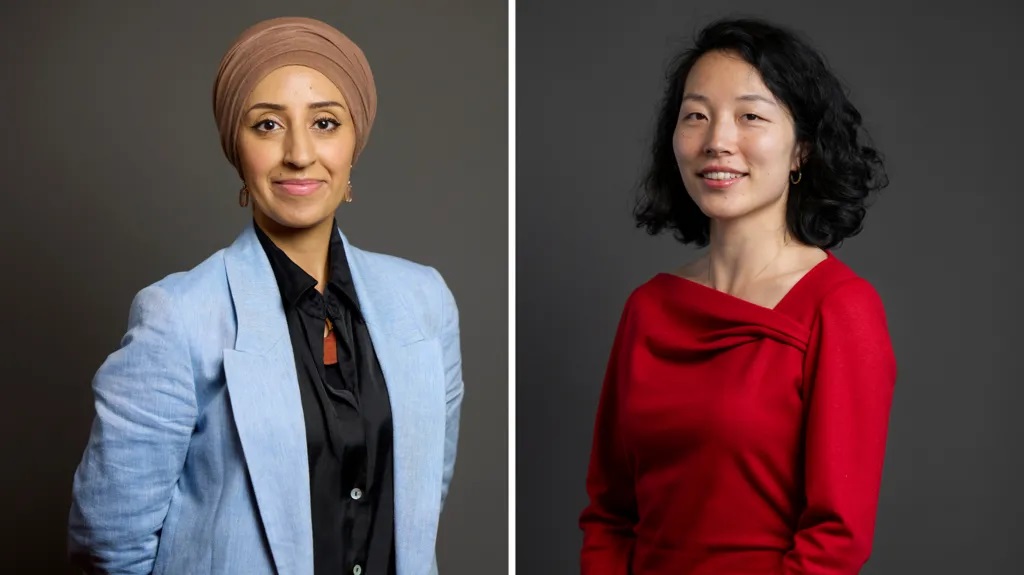
Two Labour MPs say they are “astounded” to have been denied entry to Israel while on a trip to visit the occupied West Bank.
Abtisam Mohamed and Yuan Yang said it was “vital” parliamentarians were able to witness the situation in the occupied Palestinian territory first-hand.
They were refused entry because they intended to “spread hate speech” against Israel, the nation’s population and immigration authority said.
Foreign Secretary David Lammy criticised Israeli authorities, describing the move as “unacceptable, counterproductive, and deeply concerning”.
But Conservative leader Kemi Badenoch said Israel had a right to “control its borders”, adding it was “significant” there were Labour MPs other countries did not want to let in.
Yang, the MP for Earley and Woodley, and Mohamed, the MP for Sheffield Central, flew to Israel from London Luton Airport with two aides on Saturday afternoon.
The Israeli immigration authority said Interior Minister Moshe Arbel denied entry to all four passengers after they were questioned. It accused them of travelling to “document the security forces”.
The Israeli embassy in London said in a statement on Saturday that the country “will not allow the entry of individuals or entities that act against the state and its citizens”.
It said Mohamed and Yang had “accused Israel of false claims” and were “actively involved in promoting sanctions against Israeli ministers”.
It also said they had supported campaigns aimed at boycotting the country “at a time when Israel is at war and under attack on seven fronts”.
The UK Foreign Office said the group was part of a parliamentary delegation. However, Israel’s immigration authority said the delegation had not been acknowledged by an Israeli official.
The Israeli embassy said the MPs “were offered hotel accommodation, which they declined” and the cost of their return flight to the UK was covered.
Israel’s Interior Ministry said the MPs left the country early on Sunday.
Mohamed and Yang said their trip had been organised with UK charities that had “over a decade of experience in taking parliamentary delegations”.
“We are two, out of scores of MPs, who have spoken out in Parliament in recent months on the Israel-Palestine conflict and the importance of complying with international humanitarian law,” the MPs said in a joint statement.
“Parliamentarians should feel free to speak truthful in the House of Commons, without fear of being targeted.”
Lammy said the Foreign Office had been in touch with both MPs to offer support, adding: “I have made clear to my counterparts in the Israeli government that this is no way to treat British parliamentarians.”
The Council for Arab-British Understanding and Medical Aid for Palestinians – the latter of which is a registered UK charity – said in a joint statement that they had organised the trip.
“This visit was part of that long-standing programme,” they said.
“When questioned, the group was clear, open and transparent about the aims and objectives of the visit, which included visiting a range of projects run by humanitarian and development organisations operating in the West Bank.
“The group had informed the UK consul general in Jerusalem of their visit and was planning to meet with them as part of the itinerary.”
Both Yang and Mohamed – who were first elected in 2024 – have made several interventions on the Israel-Hamas conflict in Parliament.
In February, Mohamed initiated a cross-party letter, signed by 61 MPs and lords, calling for a ban on goods from Israeli settlements on Palestinian territory, citing an opinion from the International Court of Justice (ICJ).
She has also criticised Israel for withholding humanitarian aid from Gaza, telling the House of Commons in October that international law “prohibits the starvation of civilians as a method of warfare”, and has mentioned humanitarian organisations’ claims of “ethnic cleansing” in Gaza.
In January, Yang spoke in favour of bringing sanctions against Israeli ministers Itamar Ben-Gvir and Bezalel Smotrich, after they suggested building Israeli settlements in northern Gaza to encourage Palestinians to leave.
She has also highlighted the dangerous conditions journalists and medical professionals face while in the Palestinian territory.
When asked about Israel’s decision, Conservative leader Kemi Badenoch told the BBC’s Sunday with Laura Kuenssberg that countries “should be able to control their borders”.
“What I think is shocking is that we have MPs in Labour [who] other countries won’t allow through,” Badenoch said. “I think that’s very significant.”
Her comments were rebuffed by Emily Thornberry, the Labour chair of the foreign affairs select committee, who described Yang and Mohamed as “highly respected parliamentarians” and “potential leaders”.
“Israel is badly advised to try and alienate them, to humiliate them and to treat them in this way,” she told the programme.
“I think that it’s an insult to Britain and I think it’s an insult to Parliament.”
Sir Ed Davey accused Badenoch of “yet another complete shocker”.
The Liberal Democrat leader said she “has once again shown unbelievably poor judgement by failing to back two British MPs denied entry to Israel”.
Lammy called Badenoch’s comments “disgraceful”, asking her: “Do you say the same about Tory MPs banned from China?”
During the war in Gaza, there have been protests, violent incidents and raids by Israeli forces in the West Bank. Hundreds of deaths have been reported there.
Israeli troops have been engaged in an extended operation in the occupied Palestinian territory, where two Palestinians were killed on Friday.
The current war began on 7 October 2023, when Hamas fighters launched a surprise attack on Israel, killing around 1,200 people and taking 251 hostages back to Gaza.
Since then, Gaza’s Hamas-run health ministry says more than 50,000 people have been killed. It said 1,309 people have died since a ceasefire ended on 18 March.
Lammy said: “The UK government’s focus remains securing a return to the ceasefire and negotiations to stop the bloodshed, free the hostages and end the conflict in Gaza.”
Foreign
US cancels visas for South Sudanese over deportation dispute

US Secretary of State Marco Rubio has announced that the US is immediately revoking visas issued to all South Sudanese passport holders due to the African nation refusing to accept its citizens who have been removed from the US.
Rubio, in a statement on Saturday, added that the US will also block any arriving citizens of South Sudan, the world’s newest country, at US ports of entry.
He blamed “the failure of South Sudan’s transitional government to accept the return of its repatriated citizens in a timely manner”.
A cornerstone of President Donald Trump’s immigration policy is removing unlawful migrants from the US, with the promise of “mass deportations”.
“It is time for the Transitional Government of South Sudan to stop taking advantage of the United States,” said Rubio.
“Every country must accept the return of its citizens in a timely manner when another country, including the United States, seeks to remove them,” he added.
It comes as fears grow that South Sudan may again descend into civil war.
On 8 March, the US ordered all its non-emergency staff in South Sudan to leave as regional fighting broke out, threatening a fragile peace deal agreed in 2018.
South Sudanese in the US were previously granted Temporary Protected Status (TPS), which allows them to remain in the US for a set period of time.
TPS for South Sudanese in the US had been due to expire by 3 May.
South Sudan, the world’s newest nation, gained independence in 2011 after seceding from Sudan.
But just two years later, following a rift between President Salva Kiir and Vice-President Riek Machar, the tensions erupted into a civil war, in which more than 400,000 people were killed.
A 2018 power-sharing agreement between the two stopped the fighting, but key elements of the deal have not been implemented – including a new constitution, an election and the reunification of armed groups into a single army.
Sporadic violence between ethnic and local groups has continued in parts of the country.
Since returning to office, the Trump administration has clashed with international governments over deportations of their nationals from the US.
In January, Colombian President Gustavo Petro barred two US military flights carrying deported migrants from landing in his South American country.
Petro relented after Trump promised to place crippling tariffs and sanctions on Colombia.
One of the most famous South Sudanese citizens currently in the US is Duke University star basketball player 18-year-old Khaman Maluach.
A spokesman for the university said on Sunday the school is “aware of the announcement… regarding visa holders from South Sudan”.
“We are looking into the situation and working expeditiously to understand any implications for Duke students.”
Maluach, who played for the South Sudanese Olympic basketball team last summer, spent much of his life in Uganda after fleeing his violence in his homeland as a child.
The first-year student – whose Duke team was eliminated from the national championship tournament Saturday night after losing in the semi-finals to the University of Houston – is widely expected to join the ranks of the NBA after graduation.
-
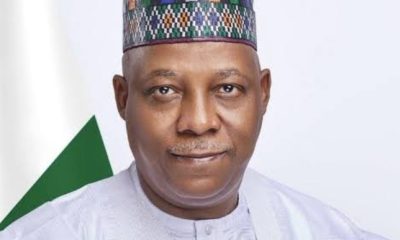
 News20 hours ago
News20 hours agoAPC opens up over alleged rift between Tinubu and his deputy, Shettima
-
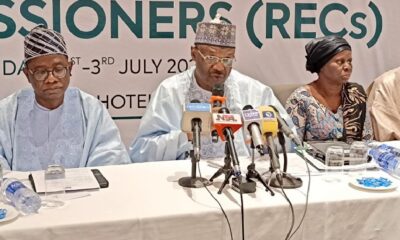
 News15 hours ago
News15 hours agoJust in: Presidency Insists INEC Chairman, Yakubu Not Sacked
-
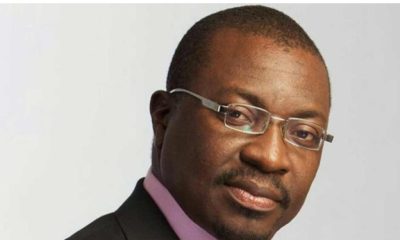
 News20 hours ago
News20 hours agoVeteran comedian opens can of worms, says I ‘ve caught many of my friends wives flirting with big men, govs
-
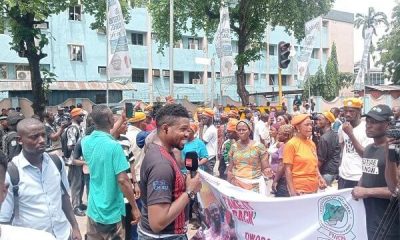
 News16 hours ago
News16 hours agoJUST IN: Police Nab leaders of April 7 nationwide protest
-
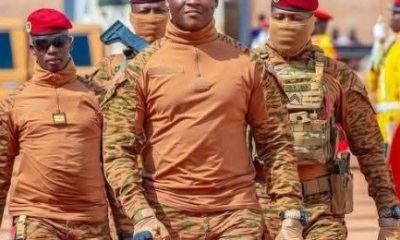
 News20 hours ago
News20 hours agoIn Burkina Faso we’re not in a democracy, but in a revolution, No Country develops in democracy” ~ Captain Ibrahim Traore.
-
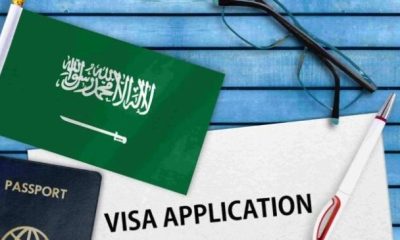
 News15 hours ago
News15 hours agoJust in: Saudi Arabia Suspends Visa Issuance to Nigeria, 13 Other Countries
-

 News15 hours ago
News15 hours agoFG Orders NYSC To Stop Early Morning Drills For Corps Members
-

 Economy20 hours ago
Economy20 hours agoSEE Black Market Dollar To Naira Exchange Rate In Lagos, FCT, April 7th 2025





